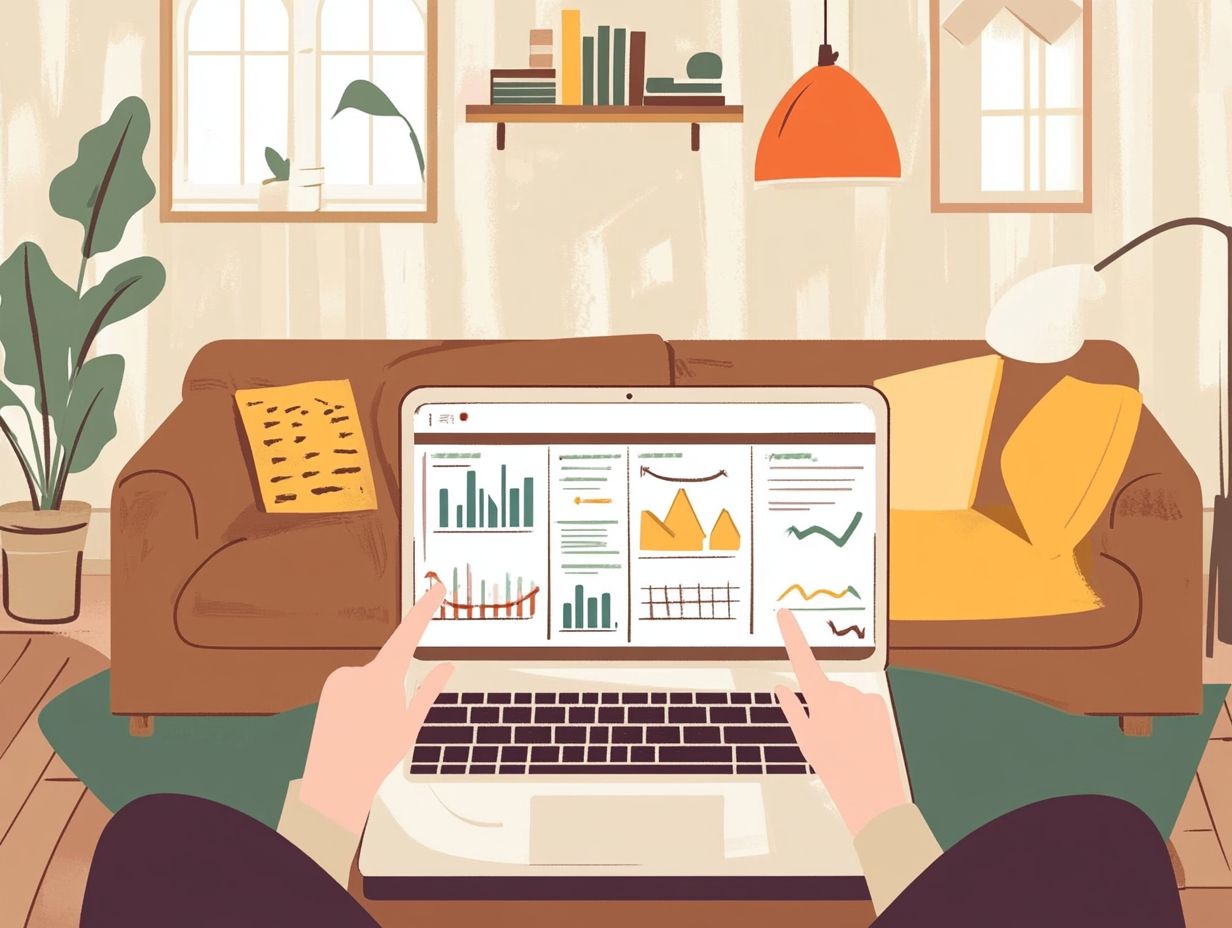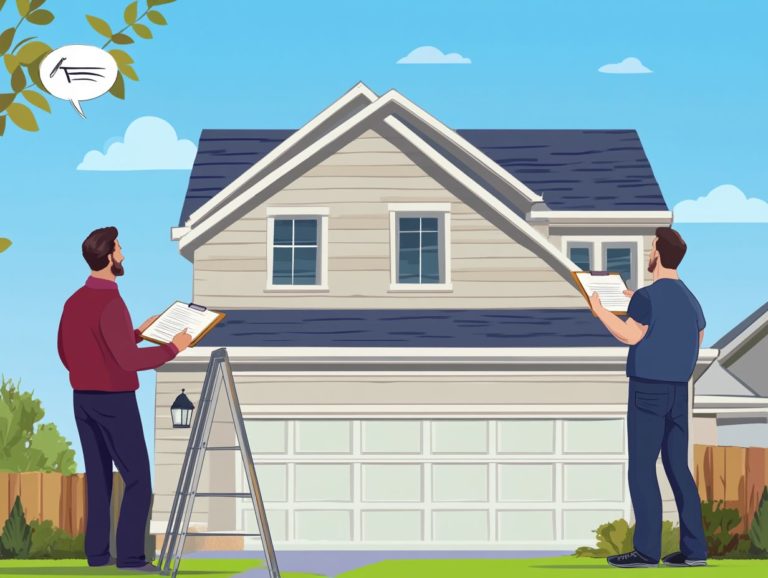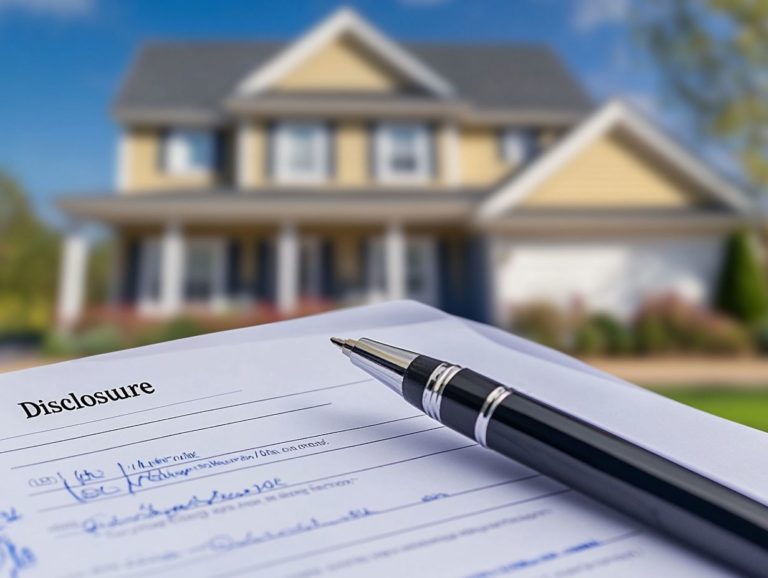How to Know If a House Is Priced Right?
Navigating the world of house pricing can indeed feel daunting, particularly if you re a first-time buyer or seller.
Understanding the myriad factors that influence property values is crucial for making informed decisions. This article will break down the key elements that determine whether a house is priced appropriately, from comparing similar sales in your area to evaluating the property s condition and market demand.
This article will also delve into effective valuation methods, highlight the benefits of working with a real estate agent, and offer insightful tips for successful negotiations.
Prepare to equip yourself with the knowledge needed to approach the housing market with confidence!
Contents
- Key Takeaways:
- Why Understanding House Pricing is Essential
- How to Spot a Well-Priced House
- How to Determine the Right Price for a House
- Working with a Real Estate Agent
- Negotiating the Price of a House
- Frequently Asked Questions
- How do I determine if a house is priced right?
- What factors should I consider when determining if a house is priced right?
- Is it possible for a house to be priced too low?
- What are some red flags to look out for when determining if a house is priced right?
- Should I solely rely on the asking price to determine if a house is priced right?
- What should I do if I believe a house is priced too high?
- What factors should I consider when determining if a house is priced right?
- Is it possible for a house to be priced too low?
- What are some red flags to look out for when determining if a house is priced right?
- Should I solely rely on the asking price to determine if a house is priced right?
Key Takeaways:

- Check comparable sales in the area to get an idea of the market value of the house.
- Consider the condition and features of the house to determine if the price is justified.
- Understand the current market demand and supply to gauge the competitiveness of the house price.
Why Understanding House Pricing is Essential
Understanding house pricing is crucial for you, whether you’re buying or selling in today s real estate market, as it directly influences your decisions.
Many factors can impact the price of a house, and knowing them can help you make the best decision. These factors include the overall economic climate, local market activity, comparable sales, and the unique features of a property.
Understanding financial considerations, like equity (the value of your ownership in the home) and appraisal (an expert’s estimation of your home’s value), offers valuable insights to navigate pricing with confidence and clarity.
Factors that Influence House Prices
Several factors can significantly influence house prices for you, including the number of bedrooms and bathrooms, square footage, and any renovations you ve made to the property.
A well-thought-out renovation can do wonders, enhancing not just the aesthetic appeal but also substantially boosting your property’s market value, making it more enticing to potential buyers.
The importance of square footage cannot be overstated; larger homes usually cost more because they offer more living space, especially in competitive markets where families seek room to grow.
By analyzing comparable properties in your neighborhood, you gain valuable context. This allows you to assess current listings against other houses that have recently sold or are on the market, offering insight into fair pricing and real estate trends that can guide your decisions.
How to Spot a Well-Priced House
Identifying the signs that a house is priced correctly is essential for you, whether you’re buying or selling. It gives you the power to make informed decisions in a competitive market.
When a property garners significant interest from potential buyers often evidenced by multiple offers it typically means the price is in line with current market expectations.
Furthermore, conducting a comparative market analysis that highlights similar properties sold at or near the asking price can reinforce the validity of the listing.
Comparable Sales in the Area
Examining comparable sales in your area is one of the most effective strategies to determine if a house is priced right; it gives you a solid benchmark based on what similar homes have recently sold for.
By analyzing various factors such as size, location, and condition of these properties, you can gain valuable insights into the market dynamics. This process not only illuminates fair pricing but also reveals trends that might otherwise have escaped your notice.
For example, a property that flaunts recent upgrades can command a premium, while those in need of repairs may be seen as less valuable.
During negotiations, having robust data on comparable sales gives you the power to make informed offers, while also equipping sellers with the essential information needed to justify their asking price.
Ready to dive into the housing market? Equip yourself with the knowledge to make confident choices today!
Condition and Features of the House

Your home’s condition and features play a huge role in its market value!
Unique upgrades and customized amenities can greatly enhance its appeal. Consider this: modern kitchens outfitted with energy-efficient appliances, sleek cabinetry, and open layouts not only draw in potential buyers but often lead to higher offers.
Updated bathrooms with contemporary fixtures and luxurious finishes also play a significant role in boosting a property’s overall allure.
Showcasing these features in your listings and during showings can create a strong, positive impression, fostering competitive bids. By emphasizing your home’s exceptional condition and highlighting these desirable features, you can effectively attract interest and achieve a successful sale.
Market Demand and Supply
Market demand and supply are essential forces that influence house pricing, creating either a seller’s market or a buyer’s market, each requiring unique pricing strategies.
In a seller’s market, where demand soars and supply dwindles, homes often sell above their asking prices. Sellers can use competitive pricing strategies to maximize their gains. Picture this: bidding wars erupt, driving up the final sale amount and instilling a sense of urgency among eager buyers.
In a buyer’s market, when supply exceeds demand, sellers may need to rethink their approach. Lowering prices or offering attractive incentives, like covering closing costs, becomes crucial to entice buyers. In this scenario, you can negotiate better deals and explore a wider array of options to secure the best value for your investment.
How to Determine the Right Price for a House
Determining the right price for a house requires careful consideration of various valuation methods, such as comparative market analysis and professional appraisals.
This thoughtful process ensures you arrive at a price that reflects both the property’s value and the current market dynamics.
Methods for Accurate House Valuation
Utilizing multiple methods for accurate house valuation is essential for gaining a comprehensive understanding of a property’s worth, giving you the power as a buyer or seller to make informed decisions.
<pYou can employ various approaches in this process. The sales comparison approach evaluates similar properties that have recently sold in your area, providing a relevant benchmark for your valuation. The cost approach calculates the value based on what it would cost to replace or reproduce the property, taking depreciation into account.
If you’re dealing with investment properties, the income approach is particularly useful, as it considers potential revenue generation. Working with a professional appraiser can enhance your valuation efforts and bring a level of expertise and objectivity that boosts your self-assessment tools.
Working with a Real Estate Agent
Collaborating with a real estate agent offers countless advantages for both buyers and sellers. Their expertise can significantly simplify the intricate process of navigating the housing market, making your experience of buying or selling a home seamless and efficient.
Benefits of Using a Professional

Engaging a professional real estate agent brings a wealth of benefits to your home-selling journey, including expert market analysis and adept negotiation strategies that can significantly enhance your selling price.
By tapping into their extensive network, agents can grant you access to exclusive listings that may remain hidden from the average buyer or seller. For example, one client managed to secure an exquisite property in a fiercely competitive neighborhood solely due to their agent’s connection with the listing agent.
These professionals stay on top of local market trends, enabling them to offer you invaluable advice on optimal pricing strategies. Their negotiation skills often yield favorable terms, even in challenging transactions.
In one remarkable case, a savvy agent saved their client thousands by successfully negotiating seller concessions during closing, illustrating the tangible benefits of professional representation.
Negotiating the Price of a House
Negotiating the price of a house is a vital skill for you, whether you re a buyer or a seller. Mastering this art can greatly affect the selling price and enhance your overall satisfaction with the transaction.
Tips for Successful Negotiations
Effective negotiation tips for buyers and sellers can pave the way for favorable outcomes, ensuring that both sides leave feeling satisfied with the final price.
One essential strategy is to craft competitive offers that demonstrate a solid understanding of the current market conditions. For instance, as a buyer, you might delve into research on similar properties in the area, giving you the power to make an informed bid that stands out without coming off as overly aggressive.
Conversely, as a seller, pricing your home accurately based on recent sales data can draw in more potential buyers. Both parties should be ready to walk away if the terms don t meet their expectations.
Consider a scenario where a buyer discovers that the asking price is significantly above market value; their readiness to reconsider can often inspire the seller to reassess their position, opening up avenues for constructive dialogue.
Frequently Asked Questions
How do I determine if a house is priced right?
In order to know if a house is priced right, you should start by researching the current market trends and comparable properties (properties similar to the one being sold) in the area. This will give you an idea of the average price range for similar homes. You can also consult with a real estate agent for their professional opinion.
What factors should I consider when determining if a house is priced right?
Some important factors to consider when evaluating the pricing of a house include location, size, condition, age of the property, and any recent renovations or upgrades. It is also important to take into account the current state of the real estate market and the demand for properties in that particular area.
Is it possible for a house to be priced too low?
Absolutely! A house can be priced too low, and that s something to watch for! This could be due to various reasons such as the seller’s motivation to quickly sell the property or a lack of knowledge about the current market trends. It is important to thoroughly research the property and consult with a professional before making any decisions.
What are some red flags to look out for when determining if a house is priced right?
Some red flags to look out for when evaluating the pricing of a house include a significant price difference compared to other similar properties in the area, a high number of days on the market, and a lack of interest from potential buyers. These could be indications of an overpriced property.
Should I solely rely on the asking price to determine if a house is priced right?
No, you should not solely rely on the asking price to determine if a house is priced right. As mentioned before, it is important to research the current market trends and comparable properties. It is also recommended to get a professional appraisal and consult with a real estate agent for their expert opinion.
What should I do if I believe a house is priced too high?
If you think a house is overpriced, consider negotiating with the seller. You might also make an offer based on the current market value.
Consulting a real estate agent can provide valuable guidance during the negotiation process.
What factors should I consider when determining if a house is priced right?
Key factors include location, size, condition, and age of the property. Recent renovations and the current real estate market demand are also important.
Is it possible for a house to be priced too low?
Yes, a house can be priced too low. This might happen if the seller wants a quick sale or is unaware of market trends.
Always research the property thoroughly and consult a professional before making decisions.
What are some red flags to look out for when determining if a house is priced right?
Watch for significant price differences compared to similar properties. A high number of days on the market or little buyer interest could indicate an overpriced home.
Should I solely rely on the asking price to determine if a house is priced right?
Don’t rely only on the asking price. Research current market trends and comparable properties.
Getting a professional appraisal and consulting with a real estate agent is also recommended.







